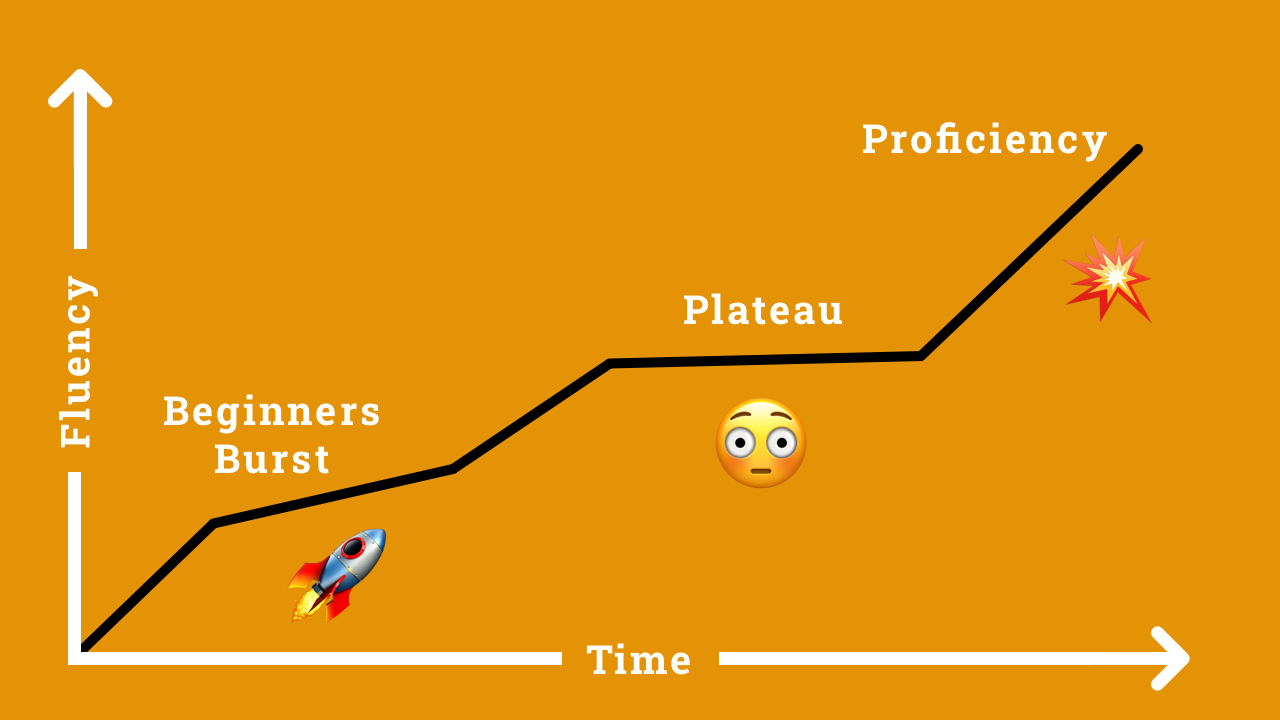Why Language Learners Plateau and How to Break Through
In the world of language learning, there's an all-too-common phenomenon known as the language learning plateau. It's a frustrating phase where learners feel they've hit a wall in their progress. They've moved past the beginner stage and have a decent grasp of the language's basics. Yet, they find it incredibly challenging to advance to higher proficiency levels.

But why does this plateau occur, and more importantly, how can language learners break through it? Let's explore.
The Language Learning Plateau, Unveiled
The language learning plateau often occurs at the intermediate stage, a point where the rapid progress of the beginner phase starts to taper off. It's akin to climbing a mountain – the initial slopes are gentle, but the climb becomes steeper as you ascend.
In the early stages of learning a new language, every word, phrase, and grammatical rule learned is a significant step forward. But as learners advance, they must grapple with more complex structures, idiomatic expressions, and cultural nuances – elements of a language that aren't as easily quantifiable or immediately rewarding as vocabulary accumulation.
 Language learning is an incredible journey filled with peaks and plateaus. This graph captures the phase we all encounter — the plateau.
Language learning is an incredible journey filled with peaks and plateaus. This graph captures the phase we all encounter — the plateau.
The Psychological Barrier
The plateau isn't just a linguistic challenge; it's also a psychological one. The initial excitement of learning a new language can wane over time, leading to decreased motivation. Learners may feel overwhelmed by the increasing complexity and start doubting their abilities, which can further hamper their progress.
Breaking Through the Plateau
Despite the challenges, the language learning plateau is not insurmountable. Here are a few strategies to push past it:
-
Understanding the nature of the learning curve: Progress in language learning (or any learning) is not linear. In the beginning, you learn quickly because everything is new, but progress gradually slows down because you have to use what you've already learned to learn new things. This isn't a problem; it's just how learning works. The issue arises when you expect to maintain the same learning pace, leading to the perception of a "plateau" when this natural slowdown occurs.
-
Don't judge your progress based on a single day: When you're feeling low or unmotivated, it's hard to see the big picture. Therefore, it's better not to judge your progress on a day-to-day basis. Instead, track your perception of your language level over at least a week, preferably two. This can be done by rating your level each day and jotting down a sentence or two about how you feel about your progress that day. If, after a week or two, you're consistently rating your progress low and feeling like you're not improving, it may be safe to say you've hit a plateau.
-
Set up measuring mechanisms before you reach a plateau: These are longer-term solutions but they're more effective than the rating method. For example, read a short story or text and mark the words and sentences you understand. Don't try to learn the content afterward. Then, leave the story alone for a while and come back to it when you feel you've hit a plateau. If you understand more than the last time, you're probably okay. If not, you've likely hit a plateau. Another example is listening to a song or album in your target language, familiarizing yourself with it, and then leaving it alone for a while. When you come back to it, if you understand more of the lyrics than last time, you have progressed. If not, you could be at a plateau.
-
Challenge yourself: Just as in working out, if you keep doing the same exercises, you will eventually stop seeing progress. Therefore, try to introduce new elements to your learning. This could be more complex texts, speaking to native speakers, or exploring different aspects of the language such as its culture and history.
-
Use the Language in Real-life Contexts: Applying what you've learned in real-life situations is crucial for progress. This could involve speaking with native speakers, watching films or reading books in the target language, or even traveling to a country where the language is spoken.
-
Take a Break: Sometimes, you might need to take a break. This doesn't mean giving up, but rather taking some time to relax and recharge before getting back to your language studies with renewed energy.
The Plateau as a Path to Mastery
The language learning plateau can be a disheartening experience, but it's an essential part of the journey to language mastery. It signifies the transition from using the language on a surface level to truly understanding and engaging with it. And with the right strategies, you can turn this challenge into an opportunity for deeper learning and richer experiences in your target language.
Leave a Reply